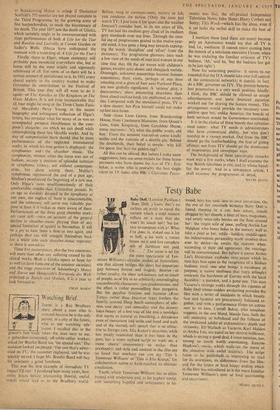Watching Brief • Timmtv., is a Ray Bradbury story about
a man who is arrested because he is the only Arson, in a city of the future, who is not watching tele- vision. I recalled this in the grocer's last week when the man next to me, a gaberdine-raincoated, off-white-collar worker, asked for, Brooke Bond tea, 'the special sort.' The assistant looked perplexed. 'The one that's adver- tised on TV,' -the customer explained, and he was quickly served. I hope Mr. Brooke Bond will buy his assistants a good luncheon.
This was the first example of immediate TV impact I'd met : i pondered how many years, how many hours before televiewing, (horrid, useful word) would lead us to the Bradbury world. Before, snug in common-room, rectory or lab, you condemn the notion ('Only the mass just watch TV; I just have it for sport and the weather forecast') consider how, in its ten years of life, TV has laid the medium grey cloak of its medium . grey standards over our lives. Through the care- ful use of programmes geared to the twelve-year- old mind, it has gone a long may towards expung- ing the words 'discipline' and 'effort' from the dictionary. The programme planners take such a low view of the needs of men and. women in our time that they fill the air waves with children's games, escapist quiz shows and cheapjack variety. Overnight, unknown nonentities become famous nonentities; their views, perhaps at . one time. amusing over o glass of beer near Portland Place, are now globally significant. A 'serious' play, a documentary show emanating elsewhere than from cloud-cuckoo-land,•are publicised, as. novel-
ties. Compared with 'the sensational .press, is a slow starter; but Pirie himself could not make up lost time faster.
Sssh--from Lime- Grove. from . Broadcasting House, from Cranbourn Mansions, from Queen's Gate, from Kingsway, from Geraldine • House, come murmurs: .-14's what she :public wants, old boy.' From the account executives come kindly -smiles and the narcotic of a double-,gin.. Behind. the doubletalk, their belief is simple :. why kill the goose that lays the golden egg?
All this can be altered. But before I make-some suggestions, here are some medals for those brave• partisans who have shown the best of TV : Eric Sykes, a writer who is probably the. best single- talent in TV today (the BBC's Christmas Panto- mania was his); the oft-praised Independent Television News; John Slater; Harry Corbett and Sooty; This Week—which has the ideas, even if it yet lacks the verbal skill to make the best of them. •
I -mention these (and there are more) because only an Apeinantus would say that all TV is bad, i.e., mediocre. (I cannot resist quoting here the remark of a television executive I know; when he was enduring the familiar criticism of TV's badness. 'Ah,' said he, 'but the badness has got to be just right.')
Now for something positive: it seems to me essential that the ITA should take over full control of the commercial networks; it should, in fact, do a BBC governor on ITV. The present benevo- lent paternalism is a very weak position. Ideally, I think, the BBC shbuld be allowed to accept advertisements and some . financial .equation worked out for sharing the licence money. This arrangement would provide the necessary com- petitive spur but, unlike America, the boards' of both services would • be Government-nominated.-
It is in the choice of these boards dial salvation must come: what TV needs is administrators who have commercial ability, but who don't worship in a money market. Out from the BBC should go the featherbedding. the fear-of giving offence; out from :ITV should go the dominance of impresarios and newspaper men.
The background, of these apocalyptic remarks' must wait .a few weeks, when I shall examine the way British television is run, and in whose. hands lies the power. And in a subsequent article, I shall examine the programmes in detail,
'Davit) s-rosa:














































 Previous page
Previous page